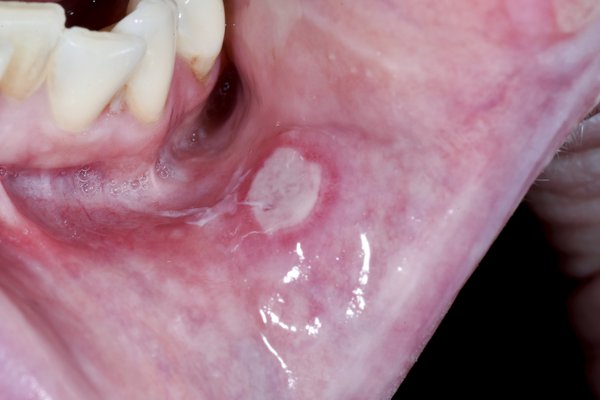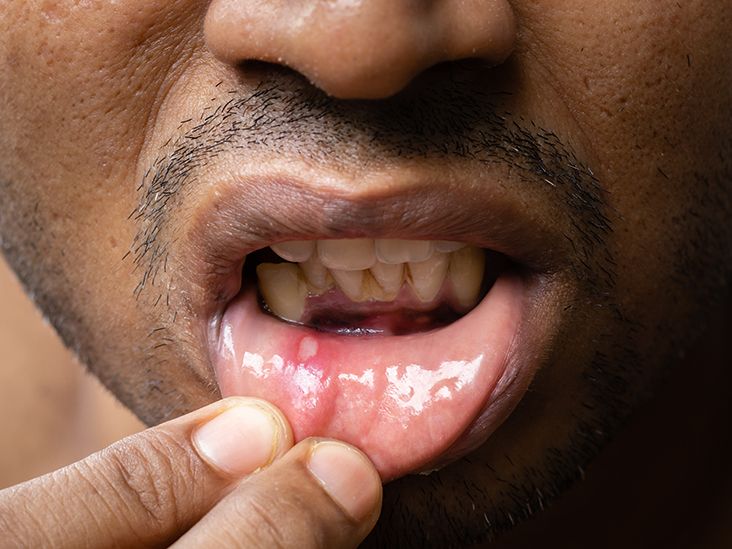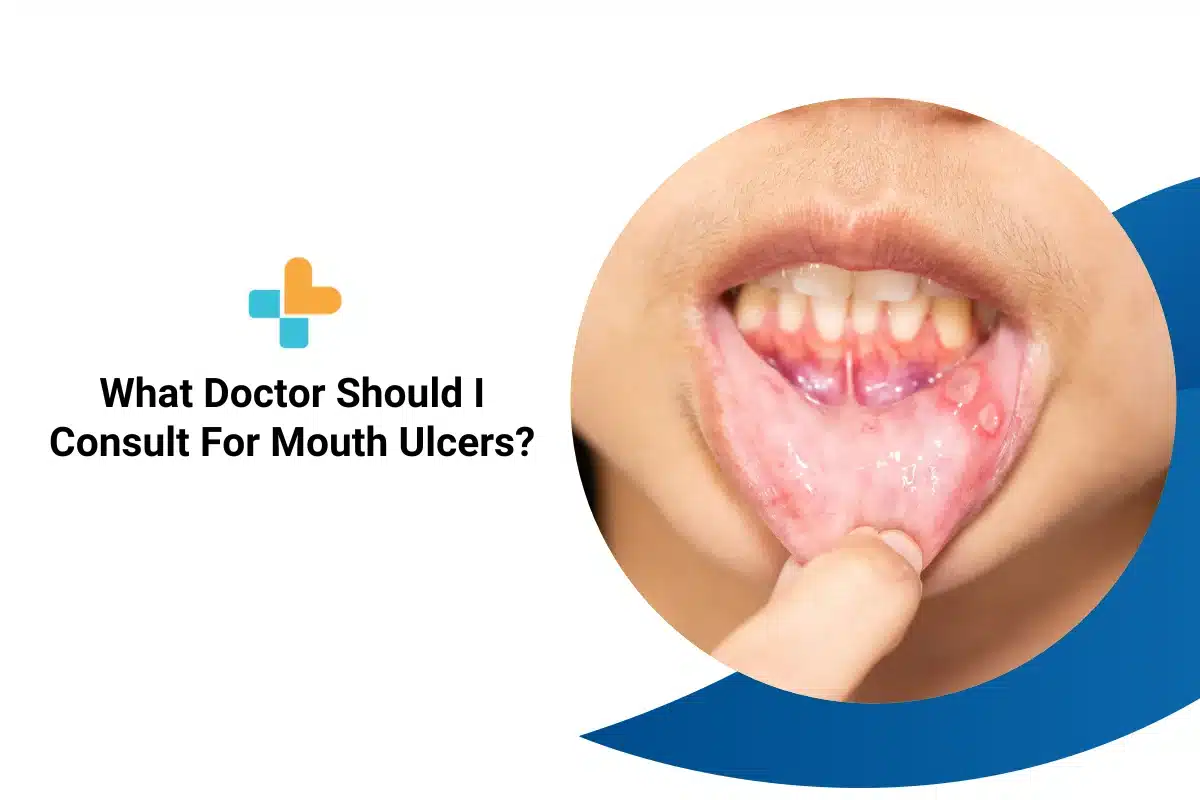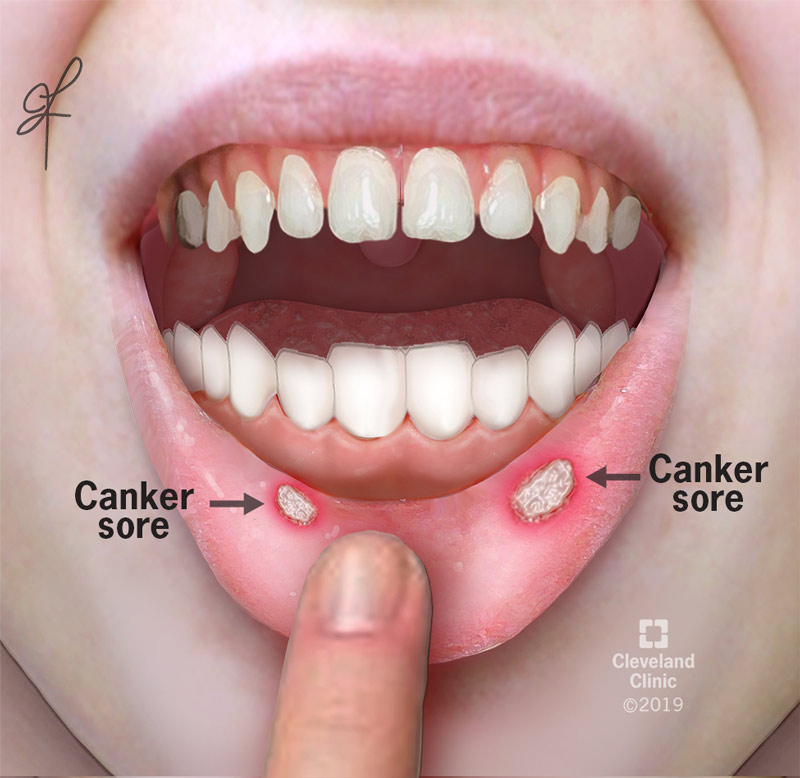When should you worry about mouth sores

Mouth sores, also known as canker sores, are common and can be painful. While most mouth sores are harmless and will go away on their own, some can be a sign of a more serious underlying condition. So, when should you worry about mouth sores?
When Should You Worry About Mouth Sores?
Mouth sores, also known as aphthous ulcers or canker sores, are common and usually harmless. However, there are instances where a mouth sore warrants a visit to the doctor. This is particularly true if the sore is unusually persistent, painful, or accompanied by other concerning symptoms. It's important to distinguish between common canker sores and more serious conditions that may mimic them.
1. Persistent Mouth Sores: How Long Is Too Long?
Most canker sores heal within 1-2 weeks. If a mouth sore lasts longer than three weeks, or if it keeps recurring frequently, you should consult a doctor. This prolonged duration could indicate an underlying medical condition, such as an immune deficiency or a vitamin deficiency. It's crucial to rule out more serious possibilities.
2. Severe Pain and Discomfort: Beyond Typical Canker Sore Pain
While canker sores can be painful, the pain associated with them is typically manageable. If the pain is excruciating, prevents eating or drinking, or is accompanied by significant swelling, you should seek medical attention. This could suggest a more serious issue, such as a severe infection or a different type of ulcer.
3. Unusual Appearance: Size, Shape, and Location
Pay attention to the appearance of your mouth sore. Large sores (larger than a centimeter), sores that bleed easily, sores with irregular borders, or sores located on the gums or tonsils should be evaluated by a healthcare professional. These characteristics might suggest conditions other than a simple canker sore.
4. Accompanying Symptoms: Fever, Fatigue, and Swollen Lymph Nodes
Mouth sores are often isolated incidents. However, if a mouth sore is accompanied by other symptoms such as fever, extreme fatigue, swollen lymph nodes, or weight loss, it is crucial to seek medical attention immediately. These are significant indicators that a more serious underlying condition may be present.
5. Recurring Sores Despite Treatment: Unresponsive to Home Remedies
Many people successfully treat minor mouth sores with over-the-counter remedies. However, if a mouth sore persists despite treatment with common home remedies or topical medications, a medical evaluation is necessary. This could indicate a need for stronger medication or investigation into the underlying cause of the recurring sores.
| Symptom | When to Worry |
|---|---|
| Duration | Sores lasting longer than 3 weeks |
| Pain | Severe, debilitating pain |
| Appearance | Large size, irregular borders, unusual location, excessive bleeding |
| Accompanying Symptoms | Fever, fatigue, swollen lymph nodes, weight loss |
| Response to Treatment | No improvement after home remedies or OTC medications |
When Should You Worry About Mouth Sores?
Mouth sores, also known as aphthous ulcers or canker sores, are common and usually harmless. However, there are instances where a mouth sore warrants a visit to the doctor. This is particularly true if the sore is unusually persistent, painful, or accompanied by other concerning symptoms. It's important to distinguish between common canker sores and more serious conditions that may mimic them.
1. Persistent Mouth Sores: How Long Is Too Long?
Most canker sores heal within 1-2 weeks. If a mouth sore lasts longer than three weeks, or if it keeps recurring frequently, you should consult a doctor. This prolonged duration could indicate an underlying medical condition, such as an immune deficiency or a vitamin deficiency. It's crucial to rule out more serious possibilities.
2. Severe Pain and Discomfort: Beyond Typical Canker Sore Pain
While canker sores can be painful, the pain associated with them is typically manageable. If the pain is excruciating, prevents eating or drinking, or is accompanied by significant swelling, you should seek medical attention. This could suggest a more serious issue, such as a severe infection or a different type of ulcer.
3. Unusual Appearance: Size, Shape, and Location
Pay attention to the appearance of your mouth sore. Large sores (larger than a centimeter), sores that bleed easily, sores with irregular borders, or sores located on the gums or tonsils should be evaluated by a healthcare professional. These characteristics might suggest conditions other than a simple canker sore.
4. Accompanying Symptoms: Fever, Fatigue, and Swollen Lymph Nodes
Mouth sores are often isolated incidents. However, if a mouth sore is accompanied by other symptoms such as fever, extreme fatigue, swollen lymph nodes, or weight loss, it is crucial to seek medical attention immediately. These are significant indicators that a more serious underlying condition may be present.
5. Recurring Sores Despite Treatment: Unresponsive to Home Remedies
Many people successfully treat minor mouth sores with over-the-counter remedies. However, if a mouth sore persists despite treatment with common home remedies or topical medications, a medical evaluation is necessary. This could indicate a need for stronger medication or investigation into the underlying cause of the recurring sores.
| Symptom | When to Worry |
|---|---|
| Duration | Sores lasting longer than 3 weeks |
| Pain | Severe, debilitating pain |
| Appearance | Large size, irregular borders, unusual location, excessive bleeding |
| Accompanying Symptoms | Fever, fatigue, swollen lymph nodes, weight loss |
| Response to Treatment | No improvement after home remedies or OTC medications |
How do I know if my mouth ulcer is serious?

How Do I Know If My Mouth Ulcer Is Serious?
Most mouth ulcers (aphthous ulcers) are benign and heal on their own within a couple of weeks. However, some symptoms can indicate a more serious underlying condition. It's crucial to distinguish between a simple canker sore and a potentially problematic ulcer. Persistent ulcers that don't heal, are unusually large or painful, or accompanied by other symptoms should prompt a visit to your doctor or dentist. They can accurately assess your situation and determine the cause.
Persistent Ulcers
A typical mouth ulcer heals within 10-14 days. If your ulcer persists for more than three weeks, it warrants a medical evaluation. This prolonged healing time could suggest a more serious issue, such as an infection or immune system problem. Don't rely on home remedies alone if the ulcer doesn't show improvement after a reasonable period.
- Consult a doctor or dentist if the ulcer persists beyond three weeks.
- Keep a record of the ulcer's size, location, and appearance to show your healthcare provider.
- Describe any associated symptoms you may be experiencing.
Unusual Size or Appearance
While most mouth ulcers are small and relatively shallow, a significantly large ulcer or one that's unusually deep or has irregular borders should raise concern. Such characteristics can be indicative of various conditions, some potentially cancerous. It's essential to have any atypical ulcer examined by a professional.
- Note the ulcer's diameter and depth.
- Observe the ulcer's edges; are they smooth or irregular?
- Take photos of the ulcer for your doctor's reference.
Accompanying Symptoms
Mouth ulcers rarely exist in isolation. If you experience other symptoms alongside your mouth ulcer, it's a strong indicator that something more serious might be going on. These accompanying symptoms could include fever, swollen lymph nodes, fatigue, unexplained weight loss, or difficulty swallowing.
- Monitor for fever, chills, or swollen glands near your jawline.
- Pay attention to any unusual fatigue or unexplained weight changes.
- Note if you're experiencing difficulty swallowing or speaking.
Location and Number of Ulcers
The location and number of ulcers can also be telling. While canker sores typically appear on the soft tissues of the mouth, ulcers in unusual locations, or multiple ulcers appearing simultaneously, could indicate a systemic issue. For example, many ulcers simultaneously might be a sign of an autoimmune disease.
- Note the precise location of each ulcer (e.g., inside cheek, tongue, lip).
- Count the number of ulcers present in your mouth.
- Pay attention to any patterns in the location or clustering of ulcers.
Bleeding and Pain
While some level of discomfort is typical with mouth ulcers, excessive bleeding or pain that's disproportionate to the ulcer's size should be evaluated. Severe, persistent bleeding may indicate a more serious underlying health condition, and intense pain might point to a deeper or more severe problem.
- Assess the amount of bleeding; is it minor or substantial?
- Rate your pain level on a scale of 1 to 10.
- Note if the pain is localized to the ulcer or radiates to other areas.
What mouth sores should I be concerned about?

What Mouth Sores Should I Be Concerned About?
Several types of mouth sores warrant concern, ranging from relatively benign to potentially serious conditions. It's crucial to understand the characteristics of concerning sores to seek appropriate medical attention if necessary. Persistent sores, those that bleed easily, are unusually painful, or accompanied by other symptoms like fever, swollen glands, or difficulty swallowing, should always prompt a visit to a dentist or doctor.
1. Canker Sores That Don't Heal
While most canker sores (aphthous ulcers) heal within 1-3 weeks, persistent or recurring canker sores that don't heal, especially if they're unusually large or painful, could indicate an underlying issue. This might include an immune system problem, nutritional deficiency (like vitamin B12 or iron), or even a less common medical condition. A dentist or doctor can perform tests to determine the cause and recommend appropriate treatment.
- Persistent sores lasting longer than 3 weeks should be evaluated.
- Recurrent outbreaks with increasing frequency or severity warrant attention.
- Sores that are unusually large or deep could indicate a more serious problem.
2. Mouth Sores Accompanied by Other Symptoms
Mouth sores appearing alongside other symptoms are often a cause for concern. Fever, swollen lymph nodes (glands) in the neck or jaw, fatigue, unexplained weight loss, or difficulty swallowing are all red flags. These symptoms could be signs of a more serious infection, such as oral thrush (candidiasis), a viral infection (like herpes simplex), or even some forms of cancer. Immediate medical attention is advisable.
- High fever (100.4°F or higher) accompanied by mouth sores requires immediate medical attention.
- Swollen lymph nodes (glands) in the neck or jaw that are tender to the touch necessitate a visit to the doctor.
- Difficulty swallowing or breathing warrants immediate emergency medical care.
3. Ulcers That Bleed Easily or Are Very Painful
Mouth sores that bleed easily, even with gentle touch, or are excruciatingly painful, deserve professional evaluation. This could indicate a more aggressive condition or an underlying health problem. Some forms of oral cancer can present with these symptoms, emphasizing the importance of prompt medical assessment.
- Any ulcer that bleeds readily should be examined by a medical professional.
- Intense pain that interferes with eating, drinking, or speaking is a significant warning sign.
- Persistent pain not alleviated by over-the-counter pain relievers requires evaluation.
4. Sores That Look Unusual or Change Appearance
Mouth sores that are unusually shaped, colored, or textured, or those that change in appearance over time (e.g., growing larger, becoming more irregular, changing color), warrant immediate attention. These characteristics could point to serious conditions, such as oral cancer. A dentist or doctor can perform a biopsy to rule out malignancy.
- Sores that are red and raised, rather than flat and pale, should be evaluated.
- Sores with irregular borders or a raised edge could be indicative of more serious problems.
- A sore that grows significantly in size or changes its appearance needs to be checked.
5. Mouth Sores Lasting Longer Than Two Weeks
Most minor mouth sores heal within a couple of weeks. However, any mouth sore that persists for more than two weeks without improvement should be evaluated by a dentist or doctor. This prolonged duration could signify a more complex underlying condition, requiring diagnostic testing and appropriate treatment.
- Sores that haven't shown any signs of healing after two weeks require professional attention.
- If home remedies haven't provided relief after two weeks, seek medical advice.
- Persistent sores can indicate a variety of problems that need proper diagnosis to ensure appropriate care.
When should I go to the doctor for mouth sores?

When Should I Go to the Doctor for Mouth Sores?
Mouth sores, also known as aphthous ulcers or canker sores, are common and usually heal on their own within a week or two. However, there are instances when you should seek medical attention. You should consult a doctor if your mouth sores:
Persist for more than two weeks without improvement. This could indicate an underlying medical condition or infection requiring treatment. Pain relief and healing may require prescription medications.
Are extremely painful and interfere with eating, drinking, or speaking. Severe pain warrants a doctor's visit to manage discomfort and explore potential causes.
Are accompanied by other symptoms like fever, swollen glands, or difficulty swallowing. These symptoms may suggest a more serious infection or illness.
Are unusually large or numerous. A significant number of sores or unusually large ones could signify a problem needing professional evaluation.
Appear after a recent injury or trauma to the mouth. While many heal on their own, some injuries may require attention to prevent complications.
When Size and Number Matter
The size and number of mouth sores can be a key indicator of whether you need medical attention. While a single, small canker sore might not be a cause for concern, a cluster of large, deep sores or many small sores appearing simultaneously could indicate a more serious condition. Seek professional advice if you notice a significant increase in the number or size of your sores. It's important to rule out conditions such as Behçet's disease, which is associated with recurring mouth ulcers.
- Multiple sores: Consider a doctor's visit if you have many sores.
- Large sores: Sores larger than 1 centimeter may warrant a doctor's evaluation.
- Deep sores: Sores that are deep and bleed easily are a sign to seek medical care.
Persistent Sores: Beyond Two Weeks
Most mouth sores heal naturally within a couple of weeks. If your sores persist for more than two weeks without showing any signs of improvement, it's crucial to see a doctor. This prolonged healing time could suggest an underlying medical issue, such as an immune system problem, vitamin deficiency, or even an infection that needs treatment. Delaying treatment can lead to further complications and prolonged discomfort.
- Lack of improvement: Persistent sores that haven't improved after two weeks require medical attention.
- Recurring outbreaks: Frequent or recurrent outbreaks, despite home treatment, should be investigated.
- Slow healing: Sores that show minimal or no signs of healing over an extended period are a significant concern.
Accompanying Symptoms: Fever, Swelling, Difficulty Swallowing
Mouth sores are often not accompanied by other symptoms. However, if your mouth sores appear alongside a fever, swollen lymph nodes, difficulty swallowing, or other systemic symptoms, it's essential to seek immediate medical attention. These signs might indicate a more serious infection, such as oral herpes, or another underlying medical condition that requires prompt diagnosis and treatment to prevent complications.
- Fever: A high fever is an indicator of potential infection.
- Swollen glands: Swollen lymph nodes might point towards an infection.
- Difficulty swallowing: Trouble swallowing suggests a serious issue requiring immediate assessment.
Trauma-Related Sores: Injuries to the Mouth
Sometimes, mouth sores develop after trauma to the mouth, such as a bite, burn, or accidental injury. While minor injuries often heal without intervention, more significant injuries or those that result in deep or persistent sores warrant medical evaluation. This is important to ensure proper healing and prevent infection or other complications. A doctor can assess the wound, provide appropriate treatment, and monitor for signs of infection.
- Deep wounds: Deep injuries inside the mouth need professional attention to prevent infection.
- Persistent bleeding: Uncontrolled bleeding from a mouth injury needs immediate medical care.
- Signs of infection: Increased pain, swelling, redness, or pus are signs of infection requiring prompt medical evaluation.
How long is too long for mouth sores?
The duration that constitutes "too long" for a mouth sore (also known as a canker sore or aphthous ulcer) depends on several factors, including the size, location, and number of sores, as well as your overall health. Generally, most mouth sores heal within 1-3 weeks. Anything persisting beyond this timeframe warrants a visit to your dentist or doctor. Larger sores, those that are extremely painful, or sores that are accompanied by other symptoms like fever, fatigue, or swollen lymph nodes, should be checked by a medical professional sooner. It's important to remember that while many mouth sores are benign and self-limiting, some can be indicative of underlying medical conditions.
What causes mouth sores and how long do they typically last?
Mouth sores, or canker sores, are typically caused by minor trauma to the mouth (e.g., biting your cheek, accidental injury), stress, hormonal changes, nutritional deficiencies (like vitamin B12 or iron), or certain medications. They often appear as small, shallow ulcers with a yellowish-white base and a red border. The majority of canker sores heal spontaneously within 1 to 3 weeks.
- Minor trauma: Biting your cheek, brushing too hard, or accidentally scratching your mouth can trigger canker sores.
- Stress and hormonal changes: Periods of high stress or fluctuations in hormone levels can increase the likelihood of developing canker sores.
- Nutritional deficiencies: Deficiencies in iron, vitamin B12, or folic acid can contribute to the development and prolonged healing of canker sores.
When should I see a doctor about a mouth sore?
While most mouth sores resolve on their own, it's crucial to seek professional medical advice if your mouth sore persists for longer than three weeks, is unusually large or painful, bleeds excessively, doesn't show signs of healing, or is accompanied by other symptoms.
- Persistent sores (longer than 3 weeks): This could indicate an underlying medical condition.
- Severe pain or bleeding: These symptoms could signify a more serious issue requiring medical attention.
- Accompanying symptoms (fever, fatigue, swollen lymph nodes): This might indicate an infection or other systemic illness.
Are there different types of mouth sores, and do their healing times vary?
Yes, there are several types of mouth sores, and their healing times can vary. Minor aphthous ulcers (the common canker sore) typically heal within 1-3 weeks. Major aphthous ulcers are larger and deeper, taking longer to heal (several weeks). Herpetiform ulcers are tiny, numerous sores that often cluster together and can take several weeks to heal. A diagnosis from a healthcare professional is necessary to determine the specific type of mouth sore.
- Minor Aphthous Ulcers: Small, shallow ulcers; heal in 1-3 weeks.
- Major Aphthous Ulcers: Larger, deeper ulcers; heal in several weeks.
- Herpetiform Ulcers: Numerous, tiny ulcers; can take several weeks to heal.
What are some home remedies for mouth sores, and when are they not enough?
Several home remedies can help manage the discomfort of mouth sores and potentially promote faster healing. These include rinsing with salt water, applying topical anesthetic gels or creams, avoiding acidic or spicy foods, and ensuring adequate hydration. However, these remedies are not a replacement for medical attention if the sore persists, worsens, or is accompanied by other symptoms.
- Salt water rinses: Help clean the area and reduce inflammation.
- Topical anesthetics: Provide temporary pain relief.
- Dietary modifications: Avoiding irritating foods can help prevent further discomfort.
When should I worry about a mouth sore?
Most mouth sores are harmless and heal on their own within a week or two. However, there are certain situations where you should seek professional medical attention. If your mouth sore is accompanied by a high fever, swollen lymph nodes in your neck or jaw, or difficulty swallowing or breathing, you should see a doctor immediately. These symptoms could indicate a more serious underlying condition, such as an infection requiring antibiotics or antiviral medication. Also, be concerned if the sore is extremely painful, persistently bleeds, is larger than usual, or doesn't show signs of healing after two weeks. Persistent sores, especially those that change in appearance or are accompanied by other concerning symptoms, should be evaluated by a dentist or doctor to rule out anything more serious like oral cancer. Pain management might be needed for particularly painful sores, but only a doctor can determine the appropriate course of action for your individual situation and diagnose the root cause.
My mouth sore is accompanied by other symptoms. Should I be concerned?
Yes, the presence of accompanying symptoms is a significant indicator of whether your mouth sore warrants immediate medical attention. Symptoms like fever, fatigue, headaches, body aches, or swollen lymph nodes, alongside the mouth sore, could suggest a more serious infection, such as herpes simplex virus (HSV) or even a bacterial infection. Difficulty swallowing or breathing is a particularly serious sign that requires immediate medical intervention. It's crucial to consider the duration of these symptoms as well. If these symptoms are persistent or worsening, don't delay seeking medical advice. Early diagnosis and treatment are essential for managing infections effectively. Don't hesitate to contact a doctor or dentist to discuss your symptoms and receive a proper evaluation.
How long should I wait before seeking medical attention for a mouth sore?
Generally, if a mouth sore shows no improvement or worsens after about two weeks, you should seek medical attention. This timeframe provides a reasonable period for minor sores to heal naturally. However, this isn't a hard and fast rule. If the sore is extremely painful, unusually large, or bleeding excessively, even early on, it's best to consult a healthcare professional sooner. Other factors such as accompanying symptoms, as mentioned earlier, should also influence your decision. If you experience difficulty swallowing, breathing problems, or a high fever, then delaying medical attention could be risky. In such instances, seeking immediate care is critical. Ultimately, it's always better to err on the side of caution and consult a doctor or dentist if you have any concerns about a mouth sore.
My mouth sore looks different from others I've had before. Should I be worried?
A change in the appearance or behavior of your mouth sore compared to previous experiences is a valid reason to seek professional medical advice. Pay attention to changes in size, color, shape, and texture. If the sore is growing rapidly, becoming more deeply ulcerated, developing unusual irregular borders, or exhibiting unusual bleeding, this warrants a visit to a doctor or dentist. These changes could indicate a more serious condition than a simple canker sore. Furthermore, if you notice any new growths or lumps in or around the sore, seek immediate medical attention as these could be potentially concerning. Don't hesitate to document the changes you've observed, including taking photos, as this will be helpful information for your doctor. Early detection is essential for effective treatment and to address potentially serious underlying health issues.

Deja una respuesta